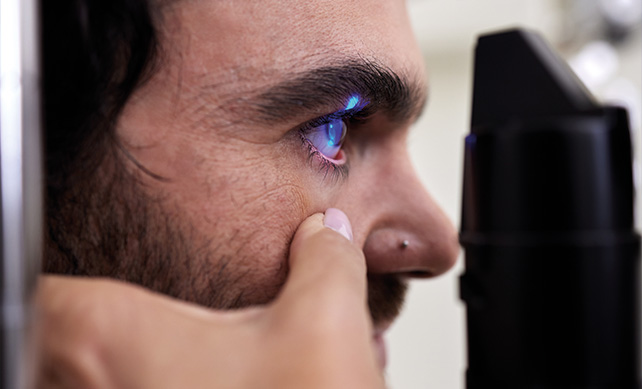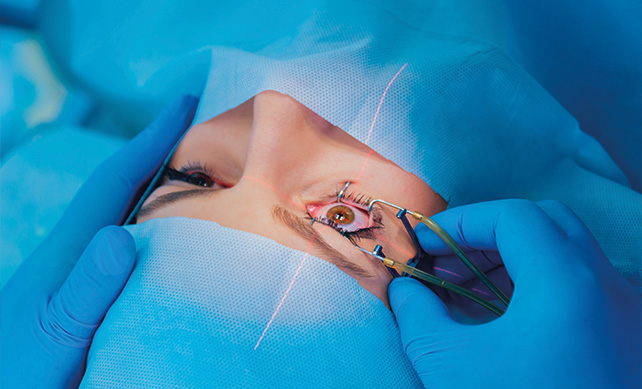Laser Eye Surgery
What Is Laser Eye Surgery
Laser eye surgery refers to a group of procedures that correct vision. They use laser technology to reshape the cornea and correct refractive errors, such as;
- Vision loss
- Myopia (nearsightedness)
- Hyperopia (farsightedness)
- Astigmatism
Laser eye surgery aims to reduce or eliminate the need for eye drops, glasses, or contact lenses and improve your vision.
Types Of Laser Eye Surgery
There are several types of eye surgery, with the most common being:
- LASIK (Laser-Assisted in Situ Keratomileusis): LASIK eye surgery is the most well-known and widely performed laser eye surgery. The surgery includes creating a thin corneal flap, lifting it, and then using an excimer laser to reshape the cornea. The flap is then repositioned, adhering naturally to the underlying corneal tissue.
- PRK (Photorefractive Keratectomy): PRK is an older procedure that predates LASIK. Instead of creating a corneal flap, the cornea’s outer layer (epithelium) is removed. Then an excimer laser is used to reshape the underlying corneal tissue. The epithelium renews over time, typically within a week. PRK has a more extended recovery period compared to LASIK. However, it may be suitable for patients with thin corneas or other specific conditions.
- LASEK (Laser Assisted Subepithelial Keratectomy): LASEK is a combination of LASIK and PRK. In this procedure, the epithelium is partially lifted using an alcohol solution, creating a thin flap. Then, an excimer laser is used to reshape the underlying corneal tissue. Afterward, the epithelial flap is repositioned, and a bandage contact lens is applied to aid healing. LASEK may be recommended for patients with thin corneas or unsuitable candidates for LASIK.
- SMILE (Small Incision Lenticule Extraction): SMILE is a more recent refractive surgery technique. It uses a femtosecond laser to create a small, lens-shaped piece of tissue within the cornea. This tissue, called a lenticule, is then removed through a small incision, which reshapes the cornea and corrects the refractive error.
SMILE is less invasive than LASIK, as it does not require the creation of a corneal flap. It is mainly used to treat myopia and astigmatism. Each laser eye surgery procedure has its unique advantages, recovery times, and suitableness for specific refractive errors or corneal conditions. It is crucial to consult with an experienced ophthalmologist or eye surgeon. So that they determine the most appropriate laser eye surgery technique for your individual needs and desired outcomes.
Everything is to assure you that you are in safe hands…
Who Is Suitable For Laser Eye Surgery
Suitableness for laser eye surgery depends on several factors related to the vision of the individual, eye health, and overall health. Specific requirements may vary depending on the type of laser eye surgery (e.g., LASIK, PRK, LASEK, or SMILE). However, the general criteria for good candidates include the following:
- Age requirement: Candidates must be at least 18 years old. Ideally, the patient should be 21 or older to ensure their eyesight has reached stability.
- Vision stability: A patient’s prescription must remain unchanged for at least one year before surgery. That is because variations in vision can impact the procedure’s success. Candidates should have good visual health. This includes healthy eyes and being free from conditions like glaucoma, cataracts, severe dry eye syndrome, or corneal diseases. These conditions may compromise the results of the surgery.
- Overall health: Maintaining good general health is crucial. Specific medical conditions, such as autoimmune diseases, diabetes, or immunodeficiency disorders, can hinder the healing process.
- Practical expectations: Candidates must thoroughly understand potential outcomes, side effects, and risks linked to laser eye surgery. They should have reasonable expectations concerning the results.
Consulting with a skilled eye doctor or eye surgeon is vital. In the consultation, the surgeon determines if you are an appropriate candidate for laser eye surgery. They will meticulously assess your eyes and medical history to determine your suitability for the procedure.
FAQ
What is the cost of laser eye surgery?
The cost of laser eye surgery varies depending on the type of procedure and the location. In the United States, the average cost of LASIK surgery is around $2,000 to $3,000 per eye.
Who should not have laser eye surgery?
Not everyone is a good candidate for laser eye surgery. People who have certain eye conditions, such as glaucoma or cataracts, or who have certain medical conditions, such as autoimmune diseases, may not be eligible for the procedure. It is important to consult with an ophthalmologist or eye surgeon to determine if laser eye surgery is appropriate for you.
Does laser eye surgery cause pain?
Laser eye surgery typically does not cause pain during the procedure. Patients are given numbing eye drops to minimize discomfort. However, some people may experience mild discomfort or a sensation of pressure during the procedure.
What is laser eye surgery?
Laser eye surgery is a type of vision correction procedure that uses a laser to reshape the cornea, the clear, front part of the eye. The most common types of laser eye surgery are LASIK and PRK.
How does laser eye surgery work?
During LASIK surgery, a thin flap is created in the cornea, which is then lifted to allow the laser to reshape the corneal tissue underneath. In PRK surgery, the cornea’s outer layer is removed entirely to allow the laser to reshape the cornea. Both procedures are performed using a computer-controlled laser.
How long does the effect of laser eye surgery last?
The effects of laser eye surgery are typically permanent, but some people may require a follow-up procedure or touch-up surgery to maintain optimal vision.
Is laser eye surgery safe?
Laser eye surgery is generally considered safe, but as with any surgical procedure, there are some risks and potential complications. These can include dry eye, infection, vision changes, and problems with night vision.
What does laser eye surgery do?
Laser eye surgery can correct a range of vision problems, including nearsightedness, farsightedness, and astigmatism. The procedure can improve overall visual acuity and reduce the need for glasses or contact lenses.
Can laser eye surgery fix astigmatism?
Yes, laser eye surgery can correct astigmatism. The procedure can reshape the cornea to correct the irregular curvature that causes astigmatism.
How long does laser eye surgery take?
The actual procedure typically takes less than 30 minutes per eye, but the entire process, including preparation and recovery time, may take several hours.




BLOG & NEWS
BLOG
Which Breast Augmentation Implant Is the Best?
see all

NEWS
TURKEYANA REDEFINING THE CONCEPT OF BEAUTY
see all




































